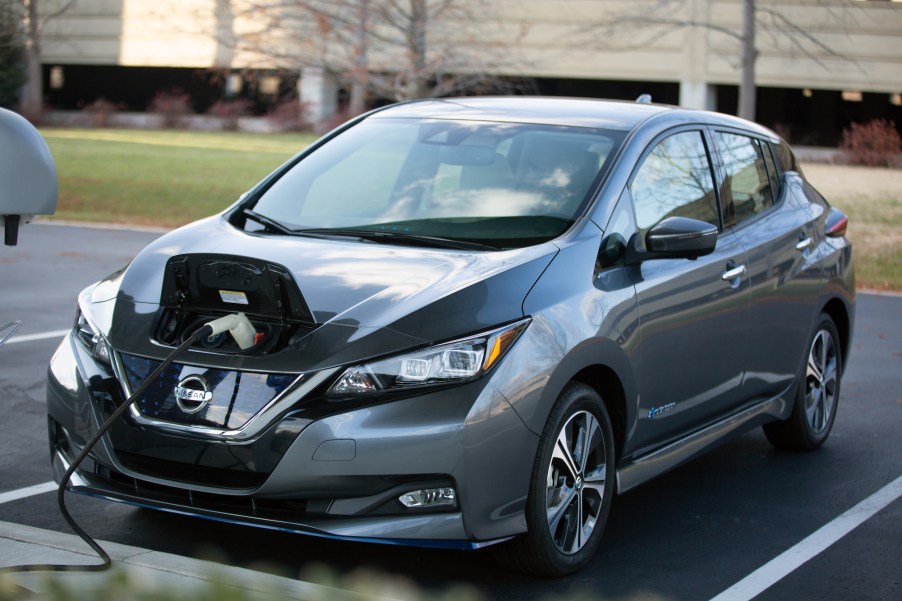
How Much Does It Cost to Charge a Nissan Leaf?
Although factors such as range anxiety may still give some people pause about purchasing an electric vehicle, the low cost of ownership is one area where many EVs excel. The 2021 Nissan Leaf is incredibly affordable to charge — you can save thousands of dollars compared to fueling up a gas-powered car, Solar Reviews shows. Here’s everything you need to know about the costs and logistics of charging the Nissan Leaf.
Options for charging a Nissan Leaf
The Nissan Leaf offers five trim levels: S, S Plus, SV, SV Plus, and SL Plus. The standard trims include a 40-kWh battery with a range of about 149 miles. On the other hand, the Plus models pack a 62-kWh battery. So they have a significantly longer range — 215 miles for the SV Plus and SL Plus and 226 miles for the S Plus.
When it comes to charging the Leaf, there are three options to choose from. For at-home charging, the default is a 120-volt AC charger that comes free when you purchase a Leaf. This charger takes approximately 20 hours to charge a 40-kWh battery and 2.5 days to charge a 62-kWh battery.
The faster at-home option is the 240-volt charger. This adds $1,690 to the Leaf’s purchase price, but it drastically reduces charging times. It charges the 40-kWh battery in eight hours and the 62-kWh battery in 11.5 hours.
Finally, you can take the Leaf to a charging station for the most rapid charge times. This will charge the 40-kWh batteries in 50 minutes and juice the 62-kWh battery to 80 percent in just an hour.
Average costs of charging a NissanLeaf
Charging the Nissan Leaf is surprisingly affordable. According to Solar Reviews, the average cost of electricity is less than 13 cents per kWh. On a national level, then, it costs just $5.14 on average to recharge the Leaf’s 40 kWh battery fully.
It’s worth noting this number will vary state-to-state. For example, Connecticut is one of the most expensive states for electricity costs, at nearly double the national average. So charging a Nissan Leaf in this state will cost about $9.48 — or $14.69 if you opt for the more powerful battery.
Washington, on the other hand, is one of the most affordable states to charge a Leaf. It costs an average of just $3.77 for the 40-kWh battery and $5.84 for the 62-kWh battery.
Savings compared to gas-powered vehicles
Driving a Nissan Leaf saves you approximately $5,500 over five years compared with driving an average 2021 gas-powered vehicle, the EPA shows.
This data highlights some other differences between the Leaf and gas-powered cars. For example, this EV gets 118 MPGe in the city, 97 MPGe on the highway, and 108 MPGe combined. By comparison, the average vehicle in 2021 gets 27 mpg.
The Leaf also has an average annual fuel cost of only $600 — significantly lower than even some of the most efficient gas or hybrid options. For example, the EPA estimates the annual fuel cost of a 2021 Toyota Corolla Hybrid is $850.
All in all, the Nissan Leaf is a highly affordable EV. If buyers take advantage of tax credits, they could pay as little as $24,120 for a Leaf. Although its range means it’s not well-suited to longer trips, its low starting price and excellent fuel savings make the Leaf a worthwhile option for anyone who wants a budget-friendly EV for city driving.


